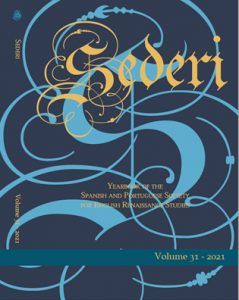
Sederi 30
Sederi 31 — 2021
EDITOR
Ana Sáez-Hidalgo
MANAGING EDITORS
Marta Cerezo Moreno
Isabel Guerrero Llorente
REVIEW EDITOR
Miguel Ramalhete
ISSN 1135-7789
Rayner, Francesca. “The story of what might have been: Interrogating Romeo and Juliet under the Portuguese dictatorship.” SEDERI 31 (2021): 73–92.
DOI: https://doi.org/10.34136/sederi.2021.4 Download PDF
Abstract
In 1969, Teatro Estúdio de Lisboa performed Anatomy of a Love Story, an interrogation of Shakespeare’s Romeo and Juliet for a generation politicized by their struggles against the dictatorship. This article delineates a narrative of what might have been if this incipient attempt to stage a more inclusive political theatre had prevailed, illustrating how attributions of success and failure to performances during this period need to be contextualized within the limitations imposed by censorship on the one hand, and, on the other, an evocation of a class-based popular theatre that excluded questions of gender and sexuality.
Keywords: Romeo and Juliet; Teatro Estúdio de Lisboa; gender; class; popular theatre; Portuguese dictatorship.
References
Bandín, Elena. 2017. “‘Unveiling’ Romeo and Juliet in Spain: Translation, Performance and Censorship.” In Romeo and Juliet in European Culture, edited by Juan F. Cerdá, Dirk Delabastita and Keith Gregor, 197–225. Amsterdam: John Benjamins.
Benite, Joaquim. 1969. “‘Anatomia de uma História de Amor’ no Vasco Santana.” Diário de Lisboa, Apr. 18,1969.
Dá Mesquita, Maria Helena. 1969. “A Companhia Teatro Estúdio Apresentou com o Título Anatomia de Uma História de Amor a sua versão de Romeu e Julieta.” In Theatre Reviews: 1969–70, n.p. Lisbon: Museu Nacional do Teatro e da Dança.
Desmet, Christy and Robert Sawyer, eds. 1999. Shakespeare and Appropriation. London: Routledge.
Dos Santos, Graça. 2004. O Espectáculo Desvirtuado: O Teatro Português sob o Reinado de Salazar (1933–1968). Lisboa: Caminho.
Fischlin, Daniel and Mark Fortier, eds. 2000. Adaptations of Shakespeare: A Critical Anthology of Plays from the Seventeenth Century to the Present. London: Routledge.
Gonçalves, Yolanda. 2016. Luzia Quê? Lisboa: Chiado Editora.
Halberstam, Jack. 2011. The Queer Art of Failure. Durham, N.C.: Duke University Press.
Hutcheon, Linda. 2006. A Theory of Adaptation. New York: Routledge.
Kidnie, Margaret Jane. 2009. Shakespeare and the Problem of Adaptation. London: Routledge.
Lanier, Douglas. 2014. “Shakespearean Rhizomatics: Adaptation, Ethics, Value.” In Shakespeare and the Ethics of Appropriation, edited by Alexa Huang and Elizabeth Rivlin, 21–40. New York: Palgrave Macmillan.
Loehlin, James N., ed. 2002. Shakespeare in Production: Romeo and Juliet. Cambridge: Cambridge University Press.
Martins, Luzia Maria. 1973. Anatomia de uma História de Amor. Lisboa: SPA/Prelo.
Pina Coelho, Rui. 2008. “Shakespeare Surveilled by Salazar: Anatomy of a Story of Censorship.” In Translation and Censorship in Different Times and Landscapes, edited by Teresa Seruya and Maria Lin Moniz, 47–60. Newcastle: Cambridge Scholars Publishing.
Porto, Carlos. 1973. Em Busca do Teatro Perdido I. Porto: Plátano Editora.
Rodrigues, Márcia Regina. 2010. Traços Épico-Brechtianos na Dramaturgia Portuguesa: O Render dos Heróis, de Cardoso Pires, e Felizmente há Luar! de Sttau Monteiro. São Paulo: Editora UNESP. Accessed July 22, 2021.
http://books.scielo.org/id/dmxrg/pdf/rodrigues-9788579831140-02.pdf.
Sanders, Julie. 2006. Adaptation and Appropriation. London: Routledge.
Tavares Rodrigues, Urbano. 1969. “Anatomia de uma História de Amor no Vasco Santana.” O Século, Apr. 18, 1969.
Thomas, Miranda Fay. 2020. Shakespeare’s Body Language: Shaming Gestures and Gender Politics on the Renaissance Stage. London: Arden.
Shakespeare, William. 2020. Hamlet. Edited by Ann Thompson and Neil Taylor. Arden Third Series. London: Bloomsbury.
Willett, John. 1986. The Theatre of Erwin Piscator: Half a Century of Politics in the Theatre. London: Methuen.
